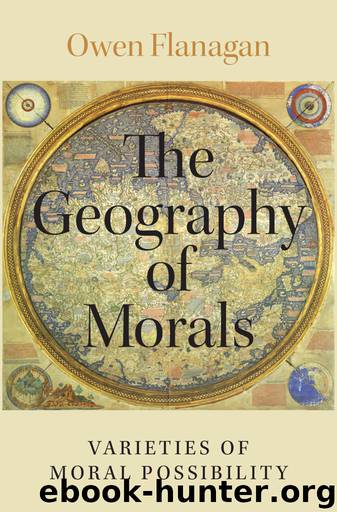The Geography of Morals: Varieties of Moral Possibility by Owen Flanagan

Author:Owen Flanagan
Language: eng
Format: epub
Publisher: Oxford University Press
Published: 2015-12-11T16:00:00+00:00
Cultural Coloration
I have insisted on something P. F. Strawson himself concedes, namely, that the reactive attitudes are subject to forces of cultural learning. Some of the reactive emotions, indeed the very names he uses for all the reactive attitudes, reveal a certain amount of local color, a color one might expect from a famous Oxford philosopher, a great admirer of Kant, and a knight of the British Empire. To speak a language of indignation, approbation, disapprobation, resentment, and gratitude is to speak in a different and less widely understood idiom than to speak of anger, fear, sadness, happiness, surprise, disgust, and contempt.
It is worth emphasizing that the normative notions of a person, and in particular of a good person or good persons, are different from, possibly orthogonal to, the normative notion of a maximally fit individual. At eulogies when we remember a person for having been good, we almost never focus on their reproductive fitness, and this despite the fact that we might well talk about their deep and abiding love for their children, if, that is, they happen to have had any.
John Locke, famously, distinguished between being a human being, a member of the species Homo sapiens, and being a person, the kind of agent whom we hold accountable and responsible. Picking out an individual as a man, as a conspecific, is pretty much a straightforward empirical matter, and the term ‘human being’ is straightforwardly descriptive. But the concept of a person is more than a biological concept. And it matters.
Strawson says that anger and its suite are attitudes toward persons. We might accept this, but doubt that the original and natural versions of these attitudes evolved to deal with personal relations. Why? Because there is reason to believe that the reactive attitudes evolved in nonhuman primates long before we existed. But if anger and the other reactive attitudes evolved as most think they did, they were designed to do work in small communities with compatriot apes, eventually fellow Homo sapiens, and only very recently to regulate relations among persons. The idea that humans are persons in any of the normative senses one sees across moral traditions—as agents with certain intrinsic rights—is a modern invention, a good invention perhaps, but an invention nonetheless.
Indeed, some of the reactive emotions on Strawson’s list clearly require development, discovery, and canonization over some segment of world historical time. Feelings of pride, dignity, and respect fit this bill. They require development of a certain conception of a person, of norms governing behavior—dos and don’ts, oughts—institutions governing moral praise and blame, and methods for punishment of those who stray too far from the right path.
It is an interesting question whether we should think of the moral conceptions that are developed, and the more complex attitudes that figure in living according to a specific moral conception, as involving modifications of the original equipment or the creation of wholly new equipment. Consider Catherine Lutz’s (1988) work among the Ifaluk of the Caroline Islands in the South Pacific. Lutz argues plausibly that the Ifaluk have moral emotions different from standard American ones.
Download
This site does not store any files on its server. We only index and link to content provided by other sites. Please contact the content providers to delete copyright contents if any and email us, we'll remove relevant links or contents immediately.
| Anthropology | Archaeology |
| Philosophy | Politics & Government |
| Social Sciences | Sociology |
| Women's Studies |
Born to Run: by Christopher McDougall(7127)
The Leavers by Lisa Ko(6948)
iGen by Jean M. Twenge(5415)
Sapiens by Yuval Noah Harari(5370)
Spare by Prince Harry The Duke of Sussex(5196)
The Kite Runner by Khaled Hosseini(5178)
Machine Learning at Scale with H2O by Gregory Keys | David Whiting(4313)
Bullshit Jobs by David Graeber(4190)
Never by Ken Follett(3956)
Goodbye Paradise(3810)
Livewired by David Eagleman(3772)
Fairy Tale by Stephen King(3396)
A Dictionary of Sociology by Unknown(3085)
Harry Potter 4 - Harry Potter and The Goblet of Fire by J.K.Rowling(3073)
The Social Psychology of Inequality by Unknown(3031)
The Club by A.L. Brooks(2925)
Will by Will Smith(2919)
0041152001443424520 .pdf by Unknown(2845)
People of the Earth: An Introduction to World Prehistory by Dr. Brian Fagan & Nadia Durrani(2736)
